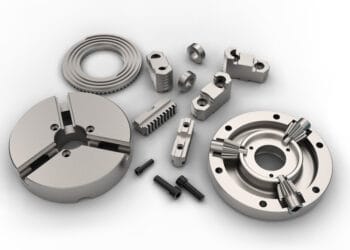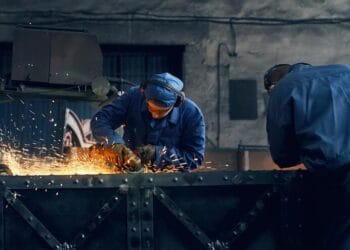Did you know nearly 60% of modern aerospace components are fabricated from advanced materials like titanium and carbon fiber composites? These complex materials are not only crucial for performance but also pose significant manufacturing challenges.
CNC (Computer Numerical Control) machining automates the control of machining tools using pre-programmed software. This allows for precise and efficient production of parts with intricate geometries. Starting with a CAD model, the design is converted into CNC programming code (G-code), which the machine follows to shape the material accurately.
CNC machining is essential for handling complex materials due to its precision, consistency, and efficiency. It can produce parts with exact tolerances, necessary for high-performance materials like titanium and carbon fiber composites. CNC machines can manage intricate designs and optimize cutting to minimize tool wear, making them versatile for various advanced materials. This technology ensures high-quality, repeatable production of complex parts, meeting stringent industry standards.
Types of Complex Materials
Complex materials are advanced materials with plenty of specialized properties making them highly valuable in modern manufacturing. These materials are ideal for their exceptional performance for demanding applications, like aerospace, automotive, and medical devices, where standard materials may fall short. The use of complex materials is popular because of the need for high strength, low weight, resistance to extreme conditions, and long-term durability.
Commonly Used Complex Materials
- Titanium: It is valued for its high strength-to-weight ratio, corrosion resistance, and biocompatibility, making it ideal for aerospace applications, medical implants, and high-performance engineering applications.
- Inconel: A family of nickel-chromium superalloys which are known for their ability to withstand extreme temperatures and corrosion, used mostly in jet engines, gas turbines, and chemical processing equipment.
- Carbon Fiber Composites: They are made from carbon fibers embedded in a polymer matrix, these composites are incredibly strong yet lightweight, and extensively used in aerospace, automotive, sports equipment, and industrial applications.
- Ceramics: They are known for their hardness, thermal stability, and wear resistance, ceramics are used in cutting tools, medical devices, and components operating in high-temperature environments.
Unique Properties and Machining Challenges
- Titanium: Its low thermal conductivity leads to heat concentration on the cutting tool, which causes rapid tool wear and potential damage. Its high toughness makes it difficult to machine.
- Inconel: The high-temperature strength of Inconel results in significant tool wear and difficulty in maintaining precision. Machining Inconel requires specialized tools and techniques to handle its toughness and hardness.
- Carbon Fiber Composites: The abrasive nature of carbon fiber composites wears down cutting tools quickly, and their layered structure leads to delamination if not handled properly. Precision and specific tooling are necessary to machine these composites without damaging them.
- Ceramics: Ceramics are extremely hard and brittle and require careful machining to avoid cracks and chips. They demand the used of diamond or other super-hard cutting tools and precise control over machining parameters.
Challenges in Machining Complex Materials
- Hardness and Toughness: Materials such as titanium and Inconel are known for their exceptional hardness and toughness. These properties, while beneficial for their end-use applications, present significant challenges during machining. The high hardness of these materials leads to increased cutting forces which cause rapid tool wear and even tool failure. Their toughness means they resist deformation, making it difficult to achieve clean cuts and precise shapes without specialized equipment.
- Heat Resistance: Materials like ceramics and composites are designed to withstand high temperatures. While this makes them ideal for use in extreme environments, it poses a challenge during machining. These materials do not dissipate heat effectively, leading to localized heating at the cutting edge. This can degrade the tool material, cause thermal expansion issues, and affect the quality and accuracy of the machined parts. Managing heat is crucial to prevent damage to both the tool and the workpiece.
- Wear and Tear and Tools: The abrasive nature of complex materials like carbon fiber composites and ceramics significantly impacts tool wear rates. These materials can erode cutting tools quickly, reducing their lifespan and increasing the cost and frequency of tool replacement. Additionally, the hardness of materials such as titanium and Inconel accelerates tool wear, necessitating the use of high-performance tooling materials such as carbide, ceramics or diamond coatings to maintain productivity and precision.
- Precision Requirements: High-performance applications often demand extremely tight tolerances and precise dimensions, especially for materials used in aerospace, medical and high-tech industries. Achieving such precision with complex materials is challenging due to their inherent properties. For example, maintaining the necessary precision while machining titanium and Inconel requires meticulous control over cutting parameters and tool path strategies to avoid deviations and ensure consistent quality.
CNC Machining Techniques for Complex Materials
- Tool Selection: Choosing the right tools is critical when machining complex materials. The tool material and coating significantly impact performance and tool life. For example, carbide tools are preferred for their hardness and wear resistance, while diamond coatings are often ideal for machining abrasive materials like carbon fiber composites. In machining metals like titanium and Inconel, tools with advanced coatings such as titanium aluminum nitride help reduce heat build-up and enhance tool longevity.
- Cutting Parameters: Setting optimal cutting speeds, feeds and depths is essential for effective machining. Different materials require specific parameters to balance material removal rates and tool life. For example, titanium needs slower cutting speeds and higher feed rates to manage heat and reduce tool wear.
- Coolant and Lubrication: Coolants and lubricants play a vital role in CNC machining, mainly with complex materials that generate significant heat. They help dissipate heat from the cutting zone, reducing thermal deformation of the workpiece and preventing excessive tool wear. For metals like titanium and Inconel, high-pressure coolant systems are often used to maintain temperature control.
- Software and Programming: Advanced CNC software and programming techniques optimize the machining process for complex materials. CAM (Computer-Aided Manufacturing) software generates precise tool paths and simulates machining operations to identify potential issues before actual cutting begins. Adaptive machining strategies, such as trochoidal milling, are used to maintain consistent cutting forces and reduce tool load.
Various Applications of CNC Machining
Aerospace Industry:
CNC machining is integral to the aerospace industry, where it is used to manufacture parts from complex materials like titanium, Inconel, and carbon fiber composites. Examples include:
- Engine Components: Turbine blades and engine casings made from Inconel, which can withstand high temperatures and stresses.
- Structural Parts: Wing spars and fuselage frames crafted from titanium for their strength-to-weight ratio and corrosion resistance.
- Interior Components: Lightweight yet strong carbon fiber composite panels for aircraft interiors.
These components require the precision and repeatability that CNC machining provides to meet stringent safety and performance standards.
Medical Devices:
The medical industry relies on CNC machining to produce precision components from biocompatible materials. Examples include:
- Implants: Titanium hip and knee implants that need exacting tolerances and smooth surfaces to integrate well with human tissue.
- Surgical Instruments: Complex instruments made from stainless steel or ceramics, requiring intricate designs and high precision.
- Dental Devices: Custom-fit crowns and bridges from ceramics, which necessitate precise shaping and finishing.
CNC machining ensures the high quality and consistency necessary for medical applications.
Automotive Industry:
In the automotive sector, particularly in high-performance and electric vehicles, CNC machining is used for:
- Engine Parts: Components like cylinder heads and engine blocks made from aluminum alloys, require accurate machining to ensure efficiency and performance.
- Electric Vehicle Components: Lightweight structural parts and battery enclosures from materials like carbon fiber composites, enhance vehicle range and performance.
- Custom Parts: Performance parts, such as turbochargers and suspension components, are often made from high-strength materials like titanium.
CNC machining supports the production of complex, high-precision parts that contribute to vehicle performance and innovation.
Custom Manufacturing:
Bespoke applications where CNC machining is essential include:
- Prototyping: Creating prototypes from advanced materials to test designs and functionality before mass production.
- Customized Products: Manufacturing one-off or small-batch products tailored to specific customer requirements, such as customized aerospace components or high-end consumer goods.
- Art and Design: Producing intricate, custom-designed pieces from materials like ceramics and composites for artistic and functional purposes.
In custom manufacturing, CNC machining provides the flexibility, precision, and capability to handle complex materials and designs.
Conclusion
CNC machining is crucial in modern manufacturing, particularly for complex materials used in aerospace, medical devices, automotive, and custom applications. This blog has underscored the importance of selecting the right tools, optimizing cutting parameters, and using advanced software to tackle materials like titanium, Inconel, carbon fiber composites, and ceramics.
As industries evolve, CNC machining’s role in enhancing precision, efficiency, and innovation will continue to expand. Embracing these advanced techniques ensures high-quality results and drives future advancements in manufacturing. In essence, CNC machining turns innovative ideas into reality with unparalleled precision and excellence.































Discussion about this post